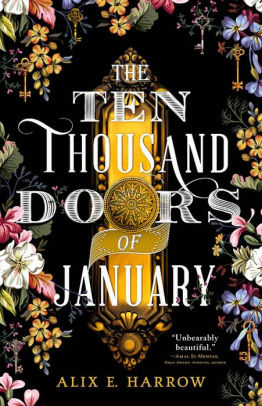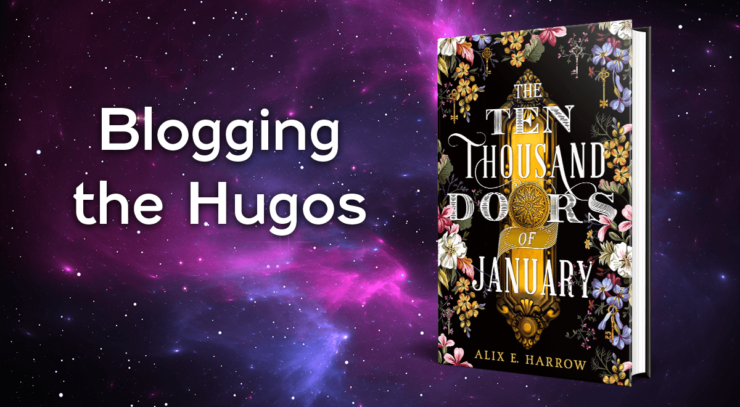In the lead-up to the 2020 Hugo Awards, we’re taking time to appreciate this year’s best novel Finalists, and what makes each of them great.
The portal to another world is one of the most tried and trusted of all genre tropes. From C.S. Lewis to Lewis Carroll, from China Miéville to Seanan McGuire and ten thousand others in between, characters have been crossing over into new worlds in books published across more than a century, and in stories passed down for centuries before that. The portal need not always be a doorway; it can be a wardrobe, or a tornado, or death itself. It can even be a book: When a little girl goes in search of her mother, who has literally become trapped within the pages of a novel, in Cornelia Funke’s Inkheart, it’s making a plot tool out of the metaphorical relationship between reader and novel. All books are gateways. They deliver us to new places, and, provided their magic is strong enough, they hold us there until we’ve completed the quest.
That’s the operating thesis of Alix E. Harrow’s The Ten Thousand Doors of January; its titular protagonist is a girl who enters, through a very peculiar book, into the life of Adelaide, a woman from an earlier era who discovers that some doors don’t lead where you expect.
January lives in the early 20th century, a ward of the wealthy, aristocratic Mr. Locke, who employs her father as an adventurer of sorts, sending him off in pursuit of rumors of fabulous treasures. Bored with her comfortable society life, January relishes losing herself in pulpy novels, and one day comes across a strange, handcrafted volume entitled “The Ten Thousand Doors.” Assuming it is a gift from her father—who has not returned from Mr. Locke’s last mission—she begins to read.
Buy the Book


The Ten Thousand Doors of January
Here, the book introduces a new narrative thread and a new and compelling protagonist—perhaps significantly more compelling than the wide-eyed teen January—in Adelaide Lee Larson, who lived a few decades before January was born. In first-person chapters that alternate with January’s tale (which is told from a third-person perspective), we follow Adelaide’s adventures as viewed through the sort of scholarly report that makes up “The Ten Thousand Doors,” penned by an unknown someone who appears to be in pursuit of Adelaide, while also sharing her story. Said story—involving unexpected journeys, a doomed love affair, and a sinister plot to end magic—turns out to be intertwined with January’s, to her (but not the reader’s) surprise.
Given that this is a book preoccupied with the power of stories, it’s appropriate that Alix E. Harrow so clearly understands how they work. The Ten Thousand Doors of January is deftly and carefully constructed, but it doesn’t feel that way while you’re reading along: it’s more subtle, solid bones wrapped in glistening emerald skin. Intercutting the twin coming of age stories of January and Adelaide (albeit one told in a reverse order of sorts, in the case of the latter) gives the plot a narrative drive it might have lacked if solely focused on January, who is a bit too much of a teen to carry the dramatic weight her counterpart’s sad tale delivers.
It’s hard to talk about this book without mentioning the prose, which flows like a river: “It is at the moments when the doors open, when things flow between the worlds, that stories happen.” “Destiny is a pretty story we tell ourselves. Lurking beneath it there are only people, and the terrible choices we make.” “Books are Doors and I wanted out.” Harrow is able to describe the experience of reading as an escape with tactile precision. This is fantasy that feels real, because it allows us to really believe that a book can be a doorway, and that doorways can lead somewhere magic.
The prose sings, the characters leap from the page, and the narrative is designed to evoke maximum feels. It’s a standalone, and doesn’t leave you yearning for a sequel so much as satisfied that it doesn’t need one. It’s a complete story that ends perfectly.
An earlier version of this article published in May 2020.
Joel Cunningham was the founding editor of the B&N Sci-Fi & Fantasy Blog (RIP), where he explored the galaxy for 5 years, picking up a Hugo Award (well, tangentially) along the way. He’s now managing editor of Lifehacker, which means he’s managing at least one thing nowadays. He lives in an apartment in Brooklyn with his wife and two children and hopes to go outside again someday. He tweets @joelevard.










